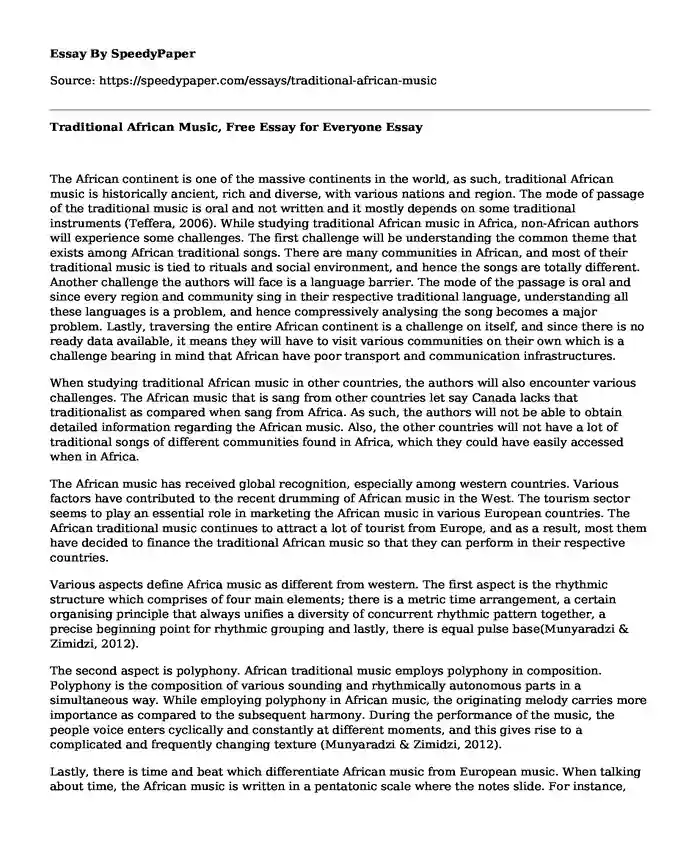The African continent is one of the massive continents in the world, as such, traditional African music is historically ancient, rich and diverse, with various nations and region. The mode of passage of the traditional music is oral and not written and it mostly depends on some traditional instruments (Teffera, 2006). While studying traditional African music in Africa, non-African authors will experience some challenges. The first challenge will be understanding the common theme that exists among African traditional songs. There are many communities in African, and most of their traditional music is tied to rituals and social environment, and hence the songs are totally different. Another challenge the authors will face is a language barrier. The mode of the passage is oral and since every region and community sing in their respective traditional language, understanding all these languages is a problem, and hence compressively analysing the song becomes a major problem. Lastly, traversing the entire African continent is a challenge on itself, and since there is no ready data available, it means they will have to visit various communities on their own which is a challenge bearing in mind that African have poor transport and communication infrastructures.
When studying traditional African music in other countries, the authors will also encounter various challenges. The African music that is sang from other countries let say Canada lacks that traditionalist as compared when sang from Africa. As such, the authors will not be able to obtain detailed information regarding the African music. Also, the other countries will not have a lot of traditional songs of different communities found in Africa, which they could have easily accessed when in Africa.
The African music has received global recognition, especially among western countries. Various factors have contributed to the recent drumming of African music in the West. The tourism sector seems to play an essential role in marketing the African music in various European countries. The African traditional music continues to attract a lot of tourist from Europe, and as a result, most them have decided to finance the traditional African music so that they can perform in their respective countries.
Various aspects define Africa music as different from western. The first aspect is the rhythmic structure which comprises of four main elements; there is a metric time arrangement, a certain organising principle that always unifies a diversity of concurrent rhythmic pattern together, a precise beginning point for rhythmic grouping and lastly, there is equal pulse base(Munyaradzi & Zimidzi, 2012).
The second aspect is polyphony. African traditional music employs polyphony in composition. Polyphony is the composition of various sounding and rhythmically autonomous parts in a simultaneous way. While employing polyphony in African music, the originating melody carries more importance as compared to the subsequent harmony. During the performance of the music, the people voice enters cyclically and constantly at different moments, and this gives rise to a complicated and frequently changing texture (Munyaradzi & Zimidzi, 2012).
Lastly, there is time and beat which differentiate African music from European music. When talking about time, the African music is written in a pentatonic scale where the notes slide. For instance, 33434 since the languages are tonal and each word has a certain tonality. In most cases, the beats in African music is provided by the dancers since they are part of the music and whistling and clapping are various ways of involving the audience. In European music, the beats are specifically for musicians (Munyaradzi & Zimidzi, 2012).
References
Agawu, K. (2011). The Challenge of African Art Music. Circuit, 21(2), 49-64. doi:10.7202/1005272ar
Munyaradzi, G., & Zimidzi, W. (2012). Comparison of Western Music and African Music. Creative Education, 3(02), 193.
Teffera, T. (2006). The role of traditional music among East African societies: the case of selected aerophones. In Proceedings from the 16th International meeting on Folk Musical Instruments, Martin Luther University Halle-Wittenberg, Germany.
Cite this page
Traditional African Music, Free Essay for Everyone. (2022, Mar 09). Retrieved from https://speedypaper.net/essays/traditional-african-music
Request Removal
If you are the original author of this essay and no longer wish to have it published on the SpeedyPaper website, please click below to request its removal:
- Depiction of Mrs. Birling and Sheila in the Play, An Inspector Calls. Free Essay.
- Traffic Lights Chip in Vehicles - Technology Essay Example
- Line Item Budget for Drug Court - Free Essay on Budgeting
- Essay Example: Future Career as a Mental Health Professional
- Essay Sample on Hiring NHFT Employees
- Free Essay Example: Future Development or Implementation of Green Buildings
- Free Essay: Information Security Continuous Monitoring-Challenges and Solutions
Popular categories





